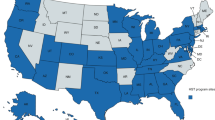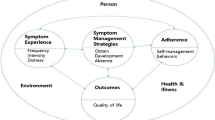Abstract
Hematopoietic cell transplantation (HCT) is an intensive treatment resulting in disease control however subsequent psychosocial distress is common. Screening for psychosocial risk factors that contribute to morbidity is underutilized; moreover, the value in screening is uncertain. We performed a retrospective study of 395 HCT patients who were screened for psychosocial risk using the Transplant Evaluation Rating Scale (TERS). Patients were classified by psychosocial risk as no-risk (TERS = 26.5, 52%) vs. at-risk (TERS > 26.5, 48%), with at-risk patients stratified by cumulative deficits into mild risk (TERS = 27–35.5, 39%) and moderate risk (TERS > 35.5, 9%). At-risk patients were more likely to be readmitted within 90 days (mild risk HR = 1.62, p = 0.02; moderate risk HR = 2.50, p = 0.002). Prior psychiatric history (HR = 1.81, p = 0.002) and poor coping skills (HR = 1.64, p = 0.04) also influenced readmission. At-risk patients were more likely to be readmitted for infection (no-risk = 12% vs. at-risk = 25%, p = 0.002). Pre-HCT screening with the TERS did not predict survival or length of stay although at-risk patients are at a heighted risk of readmission. Implementing strategies to reduce readmission in higher risk patients is warranted.
This is a preview of subscription content, access via your institution
Access options
Subscribe to this journal
Receive 12 print issues and online access
$259.00 per year
only $21.58 per issue
Buy this article
- Purchase on Springer Link
- Instant access to full article PDF
Prices may be subject to local taxes which are calculated during checkout

Similar content being viewed by others
References
Hefner J, Kapp M, Drebinger K, Dannenmann A, Einsele H, Grigoleit GU, et al. High prevalence of distress in patients after allogeneic hematopoietic SCT: fear of progression is associated with a younger age. Bone Marrow Transplant. 2014;49:581–4.
Mosher CE, Redd WH, Rini CM, Burkhalter JE, DuHamel KN. Physical, psychological, and social sequelae following hematopoietic stem cell transplantation: a review of the literature. Psycho-Oncol. 2009;18:113–27.
Kuba K, Esser P, Scherwath A, Schirmer L, Schulz-Kindermann F, Dinkel A, et al. Cancer-and-treatment-specific distress and its impact on posttraumatic stress in patients undergoing allogeneic hematopoietic stem cell transplantation (HSCT). Psycho-Oncol. 2017;26:1164–71.
Goetzmann L, Klaghofer R, Wagner-Huber R, Halter J, Boehler A, Muellhaupt B, et al. Psychosocial vulnerability predicts psychosocial outcome after an organ transplant: results of a prospective study with lung, liver, and bone-marrow patients. J Psychosom Res. 2007;62:93–100.
Illescas-Rico R, Amaya-Ayala F, Jimenez-Lopez JL, Caballero-Mendez ME, Gonzalez-Llaven J. Increased incidence of anxiety and depression during bone marrow transplantation. Arch Med Res. 2002;33:144–7.
Jenkins PL, Lester H, Alexander J, Whittaker J. A prospective-study of psychosocial morbidity in adult bone-marrow transplant recipients. Psychosomatics. 1994;35:361–7.
Lee SJ, Loberiza FR, Antin JH, Kirkpatrick T, Prokop L, Alyea EP, et al. Routine screening for psychosocial distress following hematopoietic stem cell transplantation. Bone Marrow Transplant. 2005;35:77–83.
Murphy KC, Jenkins PL, Whittaker JA. Psychosocial morbidity and survival in adult bone marrow transplant recipients—A follow-up study. Bone Marrow Transplant. 1996;18:199–201.
Foster LW, McLellan L, Rybicki L, Tyler T, Bolwell BJ. Ethical reasoning about patient eligibility in allogeneic BMT based on psychosocial criteria. Bone Marrow Transplant. 2009;44:607–12.
Futterman AD, Wellisch DK, Bond G, Carr CR. The psychosocial levels system—a new rating-scale to identify and assess emotional difficulties during bone-marrow transplantation. Psychosomatics. 1991;32:177–86.
Twillman RK, Manetto C, Wellisch DK, Wolcott DL. The transplant evaluation rating scale—a revision of the psychosocial levels system for evaluating organ transplant candidates. Psychosomatics. 1993;34:144–53.
Olbrisch ME, Levenson JL, Hamer R. The PACT—a rating-scale for the study of clinical decision-making in psychosocial screening of organ transplant candidates. Clin Transplant. 1989;3:164–9.
Maldonado JR, Dubois HC, David EE, Sher Y, Lolak S, Dyal J, et al. The Stanford Integrated Psychosocial Assessment for Transplantation (SIPAT): a new tool for the psychosocial evaluation of pre-transplant candidates. Psychosomatics. 2012;53:123–32.
Hong S, Rybicki L, Abounader D, Dabney J, Dean RM, Gerds AT et al. Pre-transplant psychosocial assessment and outcomes of allogeneic hematopoietic cell transplantation in adults. Blood. 2016;128:3552.
Trask PC, Paterson A, Riba M, Brines B, Griffith K, Parker P, et al. Assessment of psychological distress in prospective bone marrow transplant patients. Bone Marrow Transplant. 2002;29:917–25.
McLellan L, Foster L, Rybicki L, Dabney J, Visnosky M, Bolwell B. Predictive value of the psychosocial assessment of candidates for transplantation (PACT) scale in allogeneic BMT. Blood. 2007;110:978A.
Foster LW, McLellan LJ, Rybicki LA, Dabney J, Welsh E, Bolwell BJ. Allogeneic BMT and patient eligibility based on psychosocial criteria: a survey of BMT professionals. Bone Marrow Transplant. 2006;37:223–8.
Speckhart DS, Solomon SR. Psychosocial factors as measured by the transplant evaluation rating scale (TERS) predict length of hospitalization and transplant outcomes following hematopoietic stem cell transplantation. Blood. 2006;108:26A–27A.
Prieto JM, Blanch J, Atala J, Carreras E, Rovira M, Cirera E, et al. Psychiatric morbidity and impact on hospital length of stay among Hematologic cancer patients receiving stem-cell transplantation. J Clin Oncol. 2002;20:1907–17.
Gregurek R, Labar B, Mrsic M, Batinic D, Ladika I, Bogdanic V, et al. Anxiety as a possible predictor of acute GVHD. Bone Marrow Transplant. 1996;18:585–9.
Speckhart DS, Bashey A, Morris L, Solomon S, Berry T, Holland HK. Psychosocial factors as measured by the transplant evaluation rating scale (TERS) predict length of hospitalization and infectious complications following hematopoietic stem cell transplantation. Biol Blood Marrow Transplant. 2010;16:S261.
Loberiza FR, Rizzo JD, Bredeson CN, Antin JH, Horowitz MM, Weeks JC, et al. Association of depressive syndrome and early deaths among patients after stem-cell transplantation for malignant diseases. J Clin Oncol. 2002;20:2118–26.
Speckhart DS, Holland HK, Solomon SR, Morris LE, Bashey A. Utilization of resources and overall outcome in patients undergoing hematopoietic stem cell transplantation related to psychosocial factors as measured by the Transplant Evaluation Rating Scale (TERS). Blood. 2007;110:978A.
Park JE, Kim KI, Yoon SS, Hahm BJ, Lee SM, Yoon JH, et al. Psychological distress as a negative survival factor for patients with hematologic malignancies who underwent allogeneic hematopoietic stem cell transplantation. Pharmacotherapy. 2010;30:1239–46.
Andrykowski MA, Brady MJ, Hensleedowney PJ. Psychosocial factors predictive of survival after allogeneic bone-marrow transplantation for leukemia. Psychosom Med. 1994;56:432–9.
Molassiotis A, VanDenAkker OBA, Milligan DW, Goldman JM. Symptom distress, coping style and biological variables as predictors of survival after bone marrow transplantation. J Psychosom Res. 1997;42:275–85.
Foster LW, McLellan LJ, Rybicki LA, Sassano DA, Hsu A, Bolwell BJ. Survival of patients who have undergone allogeneic bone marrow transplantation: the relative importance of in-hospital lay care-partner support. J Psychosoc Oncol. 2004;22:1–20.
Hoodin F, Kalbfleisch KR, Thornton J, Ratanatharathom V. Psychosocial influences on 305 adults’ survival after bone marrow transplantation—depression, smoking, and behavioral self-regulation. J Psychosom Res. 2004;57:145–54.
Pillay B, Lee SJ, Katona L, Burney S, Avery S. Psychosocial factors predicting survival after allogeneic stem cell transplant. Support Care Cancer. 2014;22:2547–55.
Barata A, Wood WA, Choi SW, Jim HSL. Unmet needs for psychosocial care in hematologic malignancies and hematopoietic cell transplant. Curr Hematol Malig Rep. 2016;11:280–7.
Hoodin F, Kalbfleisch KR. How psychometrically sound is the transplant evaluation rating scale for bone marrow tansplant recipients? Psychosomatics. 2001;42:490–6.
Hoodin F, Kalbfleisch KR. Factor analysis and validity of the Transplant Evaluation Rating Scale in a large bone marrow transplant sample. J Psychosom Res. 2003;54:465–73.
Spring L, Li S, Soiffer RJ, Antin JH, Alyea EP, Glotzbecker B. Risk factors for readmission after allogeneic hematopoietic stem cell transplantation and impact on overall survival. Biol Blood Marrow Transplant. 2015;21:509–16.
Mohan SR, Rybicki L, Smith SD, Dean R, Pohlman B, Sweetenham JW, et al. Analysis of readmission after autologous HCT: predictive factors and clinical consequences. Blood. 2010;116:411–2.
Jaglowski SM, Ruppert AS, Hofmeister CC, Elder P, Blum W, Klisovic R, et al. The hematopoietic stem cell transplant comorbidity index can predict for 30-day readmission following autologous stem cell transplant for lymphoma and multiple myeloma. Bone Marrow Transplant. 2014;49:1323–9.
Grulke N, Larbig W, Kaechele H, Bailer H. Pre-transplant depression as risk factor for survival of patients undergoing allogeneic haematopoietic stem cell transplantation. Psycho-Oncol. 2008;17:480–7.
Prieto JM, Atala J, Blanch J, Carreras E, Rovira M, Cirera E, et al. Role of depression as a predictor of mortality among cancer patients after stem-cell transplantation. J Clin Oncol. 2005;23:6063–71.
Colon EA, Callies AL, Popkin MK, McGlave PB. Depressed mood and other variables related to bone-marrow transplantation survival in acute-leukemia. Psychosomatics. 1991;32:420–5.
Zonderman AB, Costa PT, McCrae RR. Depression as a risk for cancer morbidity and mortality in a nationally representative sample. JAMA. 1989;262:1191–5..
Satin JR, Linden W, Phillips MJ. Depression as a predictor of disease progression and mortality in cancer patients. Cancer. 2009;115:5349–61.
Pidala J, Craig BM, Lee SJ, Majhail N, Quinn G, Anasetti C. Practice variation in physician referral for allogeneic hematopoietic cell transplantation. Bone Marrow Transplant. 2013;48:63–67.
Majhail NS, Omondi NA, Denzen E, Murphy EA, Rizzo JD. Access to hematopoietic cell transplantation in the United States. Biol Blood Marrow Transplant. 2010;16:1070–5.
Mumby PB, Hurley C, Samsi M, Thilges S, Parthasarathy M, Stiff PJ. Predictors of non-compliance in autologous hematopoietic SCT patients undergoing out-patient transplants. Bone Marrow Transplant. 2012;47:556–61.
Stringhini S, Sabia S, Shipley M, Brunner E, Nabi H, Kivimaki M, et al. Association of socioeconomic position with health behaviors and mortality. JAMA. 2010;303:1159–66.
Phelan JC, Link BG, Tehranifar P. Social conditions as fundamental causes of health inequalities: theory, evidence, and policy implications. J Health Soc Behav. 2010;51:S28–40.
Lantz PM, House JS, Lepkowski JM, Williams DR, Mero RP, Chen JM. Socioeconomic factors, health behaviors, and mortality—results from a nationally representative prospective study of US adults. Jama-J Am Med Assoc. 1998;279:1703–8.
Lantz PM, Lynch JW, House JS, Lepkowski JM, Mero RP, Musick MA, et al. Socioeconomic disparities in health change in a longitudinal study of US adults: the role of health-risk behaviors. Social Sci . 2001;53:29–40.
Rosal MC, King J, Ma YS, Reed GW. Stress, social support, and cortisol: Inverse associations? Behav Med. 2004;30:11–21.
Kiecolt-Glaser JK, McGuire L, Robles TF, Glaser R. Emotions, morbidity, and mortality: New perspectives from psychoneuroimmunology. Annu Rev Psychol. 2002;53:83–107.
Pulgar A, Garrido S, Alcala A, Reyes del Paso GA. Psychosocial predictors of immune response following bone marrow transplantation. Behav Med. 2012;38:12–18.
Acknowledgements
Funding
This work was supported in part by the National Cancer Institute (NCI) K23 CA208010-01 (A.E.R).
Author information
Authors and Affiliations
Corresponding author
Ethics declarations
Conflict of interest
The authors declare that they have no conflict of interest.
Electronic supplementary material
Rights and permissions
About this article
Cite this article
Richardson, D.R., Huang, Y., McGinty, H.L. et al. Psychosocial risk predicts high readmission rates for hematopoietic cell transplant recipients. Bone Marrow Transplant 53, 1418–1427 (2018). https://doi.org/10.1038/s41409-018-0118-4
Received:
Revised:
Accepted:
Published:
Issue Date:
DOI: https://doi.org/10.1038/s41409-018-0118-4
This article is cited by
-
Psychosocial assessment practices for hematopoietic stem cell transplantation: a national survey study
Bone Marrow Transplantation (2023)
-
A challenge to discriminating psychosocial eligibility criteria: exploring the ethical justification for excluding patients with psychosocial risk factors from hematopoietic cell transplantation
Bone Marrow Transplantation (2018)
-
Another reason to encourage psychosocial risk assessment in hematopoietic cell transplantation
Bone Marrow Transplantation (2018)



